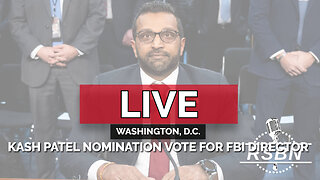Premium Only Content

George Soros, In Defence of Open Society, a Puke (TM) Audiobook
George Soros, In his own words.
========
Introduction:
========
Introduction
I believe we are living in a revolutionary moment. As a result, practically anything is possible and fallibility reigns supreme.
I’ve had a lot of experience with revolutionary moments. They play an important role in my conceptual framework, where I distinguish between far-from-equilibrium and near-equilibrium situations. They also played an important role in my life and in the life of my foundation.
My experience with revolutionary moments started when Nazi Germany occupied Hungary in 1944. I was not yet fourteen years old. By some measures, it started even earlier, when I used to join my father in the swimming pool after school and he would regale me with tales of his adventures in Siberia during the Russian Revolution of 1917. If I add my father’s reminiscences to my own experiences, I can claim to have a memory going back a hundred years.
Nineteen forty-four was the formative year in my life. One particular incident stands out in my mind. Adolf Eichmann’s first act was to set up the Jewish Council, and as a schoolboy, I was sent there to act as a runner (Jewish children were forbidden to attend school). My first assignment was to deliver mimeographed notices to what turned out to be a list of lawyers whose names started with “A” and “B” to report to the Rabbinical Seminary with a change of clothes and food for twenty-four hours. Before delivering the notices, I went home to show them to my father, who was also a lawyer. He told me to deliver the messages but warn the recipients that if they reported, they would be deported. One lawyer told me that he had always been a law-abiding citizen and that they couldn’t do him any harm. When I reported this to my father, he explained to me that in abnormal times the normal rules don’t apply and people obey them at their peril. That became our mantra, and with his guidance all of us survived. He also helped many other people. That is what made 1944 a positive experience for me.
As regards the life of my Open Society Foundations, revolutionary moments were always important. I would mention the collapse of the Soviet system in the 1980s, which was the first time the foundation played a decisive role, and our role in Europe today, where we are trying to prevent the European Union from following the example of the Soviet Union.
In spite of the intellectual and emotional preparation, we are not exempt from the fallibility that rules supreme during revolutionary moments. We can react to events, but we cannot predict them. That means that we cannot have a firm strategy unless we call flexibility a strategy. I call it a tactic, and I endorse it. It allows us to study and prepare for various scenarios. In order to find something firm, we can rely only on our values and convictions. And that is what we are doing.
This book is entitled In Defense of Open Society, yet when I set up my foundation in 1979, it was not to defend open society but to promote it. For the next twenty-five years, repressive regimes like the Soviet Union were collapsing and open societies like the European Union were emerging. The trend turned negative only after the global financial crisis of 2008. The nadir was reached in 2016 with Brexit in Europe and the election of President Trump in the United States. I was an active participant in these events, and I had plenty to say about them. Now I see some early signs that the tide is turning again.
This book is a selection of my recent writings. It is divided into six chapters. The first chapter deals with the unprecedented dangers that confront open societies today. As the founder of the Open Society Foundations, I regard this as my primary concern today. The chapter contains two speeches I gave at the World Economic Forum in Davos in January 2018 and 2019. The 2018 speech deals with the dangers posed by social media platforms. In the 2019 speech, I warned the world of an even greater threat presented by the instruments of control that machine learning and artificial intelligence can put in the hands of repressive regimes. I focused on the Xi Jinping regime in China, which is the most advanced in these areas. I feel obliged to present the two speeches separately because my own thinking underwent a radical change during the intervening year.
I started formulating my conceptual framework as a student at the London School of Economics under the influence of my mentor, the Austrian philosopher Karl Popper, and I continued developing it over the course of my life. My philosophy has guided me both in making money and in spending it on making the world a better place—but it is not about money; it is about the complicated relationship between thinking and reality. I have decided to postpone the explanation of my philosophy until the last chapter because the best account is my article in the Journal of Economic Methodology in 2014. It was addressed to a specialized audience and it is therefore rather heavy going. I was afraid that I would lose many readers if I inflicted it on them early on. I hope somebody will write an explanation that is more accessible to the general public, but I am both too old and too busy to do it myself. I did, however, try to make it more accessible by revising and abridging the Journal of Economic Methodology article for this book.
I’ve devoted the second chapter to what I call my political philanthropy. I wrote my first essay on the subject in 2012, where I posed the questions: How could someone who is admittedly selfish and self-centered create a selfless foundation whose goal is to make the world a better place? And how can he pursue that goal even if the results don’t satisfy him? I answered the questions very honestly. I have updated that essay for this book not only to reflect my current views but also because both the external situation and my foundation’s structure and activities are very different today from what they were in 2012. Reflecting the changed conditions, some of my views have also changed.
The external situation has greatly deteriorated. As I explain in an unprecedented danger has emerged in recent years. The rapid development of artificial intelligence and machine learning has produced instruments of social control that give repressive regimes an innate advantage over open societies. For dictatorships, they provide useful tools; for open societies, they pose a mortal danger. Our main task today is to find ways to counteract this built-in disadvantage.
In 2012, my foundation was still in an expansionary stage, although the external situation was deteriorating. I was still active in the financial markets, and my fund was making a lot of money. This put us in an unusual position, as if we were exempt from the law of gravity. Those days are over. I have retired from the financial markets, and financial repression has made it much more difficult for all fund managers to make money. At the same time, the demand for our support has greatly increased, and our supply of funds has not been able to keep up with it. Consequently, the law of gravity is catching up with us with exceptional force.
In considering the various problems confronting my foundations, I must mention another issue that I and my foundations need to deal with: aging. It is a continuous process, so it was also present in 2012, and I discussed it at length in my essay. But another seven years have passed since then. The first president of the foundation, Aryeh Neier, retired in 2012, and it fell to the new leadership headed by Patrick Gaspard, former US ambassador to South Africa, to thoroughly reorganize the foundation. They are making good progress.
Although I am in my ninetieth year, I am reluctant to retire because I feel I still have something to contribute, and as the founder, I can be faster and more entrepreneurial than the governing board that will succeed me. But I have less energy and endurance than I used to have. I have delegated many duties to my son Alex, who is also part of the new leadership.
The most dramatic positive change that has occurred in my foundation is the rising importance of the Central European University (CEU). I established it in 1991, but I hardly mentioned it in my 2012 essay. Since then, it has emerged as the foremost defender of academic freedom; it has also qualified as one of the one hundred best universities in the social sciences in the world. We have ambitious plans for its future. I consider this so important that I devote a whole chapter to it ().
When I was actively engaged in the financial markets, I wrote a lot on the subject. Contrary to the prevailing equilibrium theory based on the theory of rational expectations, I consider financial markets inherently unstable. My first book, The Alchemy of Finance, was published in 1987. Since then, it has become compulsory reading in business schools, but it was studiously ignored by academic economists until the crash of 2008. They dismissed it as the conceit of a successful hedge fund manager who imagines himself to be a philosopher. This judgment was so unanimous that I could not ignore it. I came to consider myself a failed philosopher. I even gave a lecture entitled “A Failed Philosopher Tries Again” in 1995.
All this changed after the crash of 2008. Economists could not ignore their failure to predict it. I had the pleasure of hearing the then governor of the Bank of England, Mervyn King, publicly acknowledge that my theory of the financial markets deserves consideration. The change of attitude among academic economists was even more gratifying. There was a widespread recognition that the prevailing paradigm had failed, and a willingness to rethink the basic assumptions emerged. This led me to become a sponsor of the Institute for New Economic Thinking (INET), whose mission is to break the monopoly that the efficient market hypothesis and rational expectations theory enjoyed in academic and official circles. I convoked a group of distinguished economists, including several Nobel Prize winners, and they responded enthusiastically. A board was formed under the chairmanship of Anatole Kaletsky. My friend and former colleague Rob Johnson became the president of INET and provides inspired leadership. INET is flourishing, but only because I am not on its governing board. I see a potential conflict between being the founder and a financial supporter of INET and the proponent of a particular theory of market dislocations.
I wrote a lot of articles in the aftermath of the crash. I passionately disagreed with Treasury Secretary Hank Paulson’s plan to bail out the banks by using a public fund called the Troubled Asset Relief Program (TARP) to take toxic assets off their balance sheets. I argued that it would be much more effective to inject the $700 billion provided by TARP into the balance sheet of the banks as equity. It would have gone a long way to resolve the financial crisis. I worked closely with the Democratic leadership in Congress to modify the TARP Act so as to allow the money to be used for recapitalizing the banks through the purchase of equity interests. That is what the UK government has done: it nationalized failing banks and eventually recovered most of the money it had invested. But my friend Larry Summers, who succeeded Hank Paulson, rejected it out of hand because, according to him, nationalizing banks amounted to socialism and would never be accepted in America. I had many other ideas I had hoped to put into practice when Barack Obama became president, including a fundamental reform of the mortgage system, but none of them were adopted. Some of the material written on this subject, one as recently as 2018, constitute of the book.
The crash of 2008 led directly to the euro crisis of 2011. That got me interested in the deficiencies of the euro, and that led me to study the structural weaknesses of the European Union. My interest continued to grow as more and more deficiencies became apparent. My recent articles on this subject make up .
As mentioned before, is devoted to the revised and abridged Journal of Economic Methodology article.
==================
Chapter One:
==================
CHAPTER 1
The Unprecedented Dangers Facing Open Societies
“IT Platforms and Xi Jinping’s Social Credit System”
PART 1
Remarks delivered at the World Economic Forum
Davos, Switzerland, January 25, 2018
THE CURRENT MOMENT IN HISTORY
It has become something of an annual Davos tradition for me to give an overview of the current state of the world. This time I want to focus on a few issues that are foremost on my mind.
I find the current moment in history rather painful. Open societies are in crisis, and various forms of dictatorships and mafia states, exemplified by Vladimir Putin’s Russia, are on the rise. In the United States, President Donald Trump would like to establish a mafia state, but he can’t because the Constitution, other institutions, and a vibrant civil society won’t allow it.
Whether we like it or not, my foundations, most of our grantees, and myself personally are fighting an uphill battle protecting the democratic achievements of the past. My foundations used to focus on the so-called developing world, but now that the open society is also endangered in the United States and Europe, we are spending more than half our budget closer to home because what is happening here is having a negative impact on the whole world.
But protecting the democratic achievements of the past is not enough; we must also safeguard the values of open society so that they will better withstand future onslaughts. Open society will always have its enemies, and each generation has to reaffirm its commitment to open society for it to survive.
The best defense is a well-prepared counterattack. The enemies of open society feel victorious, and this induces them to push their repressive efforts too far, generates resentment, and offers opportunities to push back. That is what is happening in places like Hungary today.
THE SURVIVAL OF OUR CIVILIZATION IS AT STAKE
I used to define the goals of my foundations as “defending open societies from their enemies, making governments accountable and fostering a critical mode of thinking.” But the situation has deteriorated. Not only the survival of open society but also the survival of our entire civilization is at stake. The rise of leaders such as Kim Jong-un in North Korea and Donald Trump in the United States have much to do with this. Both seem willing to risk a nuclear war in order to keep themselves in power. But the root cause goes even deeper.
Mankind’s ability to harness the forces of nature, both for constructive and destructive purposes, continues to grow while our ability to govern ourselves properly fluctuates, and it is now at a low ebb.
The threat of nuclear war is so horrendous that we are inclined to ignore it. But it is real. Indeed, the United States is set on a course toward nuclear war by refusing to accept that North Korea has become a nuclear power. This creates a strong incentive for North Korea to develop its nuclear capacity with all possible speed, which in turn may induce the United States to use its nuclear superiority preemptively—in effect to start a nuclear war in order to prevent nuclear war, an obviously self-contradictory strategy.
The fact bears repeating that North Korea has become a nuclear power and there is no military action that can prevent what has already happened. The only sensible strategy is to accept reality, however unpleasant it is, and to come to terms with North Korea as a nuclear power. This requires the United States to cooperate with all the interested parties, China foremost among them. Beijing holds most of the levers of power against North Korea but is reluctant to use them. If China came down on Pyongyang too hard, the regime could collapse, and China would be flooded by North Korean refugees. What is more, Beijing is reluctant to do any favors for the United States, South Korea, or Japan—against each of which it harbors a variety of grudges. Achieving cooperation will require extensive negotiations, but once it is attained, the alliance would be able to confront North Korea with both carrots and sticks. The sticks could be used to force North Korea to enter into good-faith negotiations and the carrots to reward it for verifiably suspending further development of nuclear weapons. The sooner a so-called freeze-for-freeze agreement can be reached, the more successful the policy will be. Success can be measured by the amount of time it would take for North Korea to make its nuclear arsenal fully operational. I’d like to draw your attention to two seminal reports just published by Crisis Group on the prospects of nuclear war in North Korea.
The other major threat to the survival of our civilization is climate change, which is also a growing cause of forced migration. I have dealt with the problems of migration at great length elsewhere, but I must emphasize how severe and intractable those problems are. I don’t want to go into details on climate change either, because it is well known what needs to be done. We have the scientific knowledge; it is the political will that is missing, particularly in the Trump administration.
Clearly, I consider the Trump administration a danger to the world. But I regard it as a purely temporary phenomenon that will disappear in 2020, or even sooner. I give President Trump credit for motivating his core supporters brilliantly, but for every core supporter, he has created a greater number of core opponents who are equally strongly motivated. That is why I expect a Democratic landslide in 2018.
My personal goal in the United States is to help reestablish a functioning two-party system. This will require not only a landslide in 2018 but also a Democratic Party that will aim at nonpartisan redistricting, the appointment of well-qualified judges, a properly conducted census, and other measures that a functioning two-party system requires.
THE DANGERS POSED BY SOCIAL MEDIA GIANTS
I want to spend the bulk of my remaining time on another global problem: the rise and monopolistic behavior of the giant IT platform companies. These companies have often played an innovative and liberating role. But as Facebook and Google have grown into ever-more powerful monopolies, they have become obstacles to innovation and have caused a variety of problems, of which we are only now beginning to become aware.
Companies earn their profits by exploiting their environment. Mining and oil companies exploit the physical environment; social media companies exploit the social environment. This is particularly nefarious because social media companies influence how people think and behave without them even being aware of it. This has far-reaching adverse consequences on the functioning of democracy, particularly on the integrity of elections.
The distinguishing features of internet platform companies is that they are networks and that they enjoy rising marginal returns, which accounts for their phenomenal growth. The network effect is truly unprecedented and transformative, but it is also unsustainable. It took Facebook eight and a half years to reach a billion users and half that time to reach the second billion. At this rate, Facebook will run out of people to convert in less than three years.
Facebook and Google effectively control over half of all internet advertising revenue. To maintain their dominance, they need to expand their networks and increase their share of users’ attention. Currently they do this by providing users with a convenient platform. The more time users spend on the platform, the more valuable they become to the companies.
Content providers also contribute to the profitability of social media companies because they cannot avoid using the platforms and have to accept whatever terms they are offered.
The exceptional profitability of these companies is largely a function of their avoiding responsibility for—and avoiding paying for—the content on their platforms.
They claim they are merely distributing information. But the fact that they are near-monopoly distributors makes them public utilities and should subject them to more stringent regulations, aimed at preserving competition, innovation, and fair and open universal access.
The business model of social media companies is based on advertising. Their true customers are the advertisers. But gradually a new business model is emerging, one based not only on advertising but also on selling products and services directly to users. They exploit the data they control, bundle the services they offer, and use discriminatory pricing to keep for themselves more of the benefits that otherwise they would have to share with consumers. This enhances their profitability even further—but the bundling of services and discriminatory pricing undermine the efficiency of the market economy.
Social media companies deceive their users by manipulating their attention and directing it toward their own commercial purposes. They deliberately engineer addiction to the services they provide. This can be very harmful, particularly for adolescents. There is a similarity between internet platforms and gambling companies. Casinos have developed techniques to hook gamblers to the point where they gamble away all their money, even money they don’t have.
Something very harmful and maybe irreversible is happening to human attention in our digital age. Not just distraction or addiction—social media companies are inducing people to give up their autonomy. The power to shape people’s attention is increasingly concentrated in the hands of a few companies. It takes a real effort to assert and defend what John Stuart Mill called “the freedom of mind.” There is a possibility that once it is lost, people who grow up in the digital age will have difficulty regaining it. This may have far-reaching political consequences. People without the freedom of mind can be easily manipulated. This danger looms not only in the future; it already played an important role in the 2016 US presidential elections.
But there is an even more alarming prospect on the horizon. There could be an alliance between authoritarian states and these large, data-rich IT monopolies that would bring together nascent systems of corporate surveillance with an already developed system of state-sponsored surveillance. This may well result in a web of totalitarian control the likes of which not even George Orwell could have imagined.
The countries in which such unholy marriages are likely to occur first are Russia and China. The Chinese IT companies in particular are fully equal to the American ones. They also enjoy the full support and protection of the Xi Jinping regime. The government of China is strong enough to protect its national champions, at least within its borders.
US-based IT monopolies are already tempted to compromise themselves in order to gain entrance to these vast and fast-growing markets. The dictatorial leaders in these countries may be only too happy to collaborate with them because they want to improve their methods of control over their own populations and expand their power and influence in the United States and the rest of the world.
The owners of the platform giants consider themselves the masters of the universe, but in fact they are slaves to preserving their dominant position. It is only a matter of time before the global dominance of the US IT monopolies is broken. Davos is a good place to announce that their days are numbered. Regulation and taxation will be their undoing, and EU Commissioner for Competition Margrethe Vestager will be their nemesis.
There is also a growing recognition of a connection between the dominance of the platform monopolies and the rising level of inequality. The concentration of share ownership in the hands of a few private individuals plays some role, but the peculiar position occupied by the IT giants is even more important. They have achieved monopoly power, but at the same time they are also competing against each other. They are big enough to swallow start-ups that could develop into competitors, but only the giants have the resources to invade each other’s territory. They are poised to dominate the new growth areas that artificial intelligence is opening up, like driverless cars.
The impact of innovations on unemployment depends on government policies. The European Union and particularly the Nordic countries are much more farsighted in their social policies than the United States. They protect the workers, not the jobs. They are willing to pay for retraining or retiring displaced workers. This gives workers in Nordic countries a greater sense of security and makes them more supportive of technological innovations than workers in the United States.
The internet monopolies have neither the will nor the inclination to protect society against the consequences of their actions. That turns them into a menace, and it falls to the regulatory authorities to protect society against them. In the United States, the regulators are not strong enough to stand up against internet monopolies’ political influence. The European Union is better situated because it doesn’t have any platform giants of its own.
The European Union uses a different definition of monopoly power from the United States. US law enforcement focuses primarily on monopolies created by acquisitions, whereas EU law prohibits the abuse of monopoly power irrespective of how it is achieved. Europe has much stronger privacy and data protection laws than America. Moreover, US law has adopted a strange doctrine first proposed by Supreme Court Justice Robert Bork: it measures harm as an increase in the price paid by customers for services received—and that is almost impossible to prove when most services are provided for free. This leaves out of consideration the valuable data that platform companies collect from their users.
Commissioner Vestager is the champion of the European approach. It took the EU seven years to build a case against Google, but as a result of her success, the process has been greatly accelerated. Due to her proselytizing, the European approach has begun to affect attitudes in the United States as well.
THE RISE OF NATIONALISM
I have mentioned some of the most pressing and important problems confronting us today. In conclusion, let me point out that we are living in a revolutionary period. All of our established institutions are in a state of flux, and in these circumstances both fallibility and reflexivity are operating at full force.
I lived through similar conditions in my life, most recently some thirty years ago. That is when I set up my network of foundations in the former Soviet empire. The main difference between the two periods is that thirty years ago the dominant creed was international governance and cooperation. The European Union was the rising power, and the Soviet Union the declining one. Today, however, the motivating force is nationalism. Russia is resurgent, and the European Union is in danger of abandoning its values.
As you will recall, the previous experience didn’t turn out well for the Soviet Union. The Soviet empire collapsed, and Russia has become a mafia state that has adopted a nationalist ideology. My foundations did quite well: the more advanced members of the Soviet empire joined the European Union.
Now our aim is to help save the European Union in order to radically reinvent it. The EU used to enjoy the enthusiastic support of the people of my generation, but that changed after the financial crisis of 2008. The EU lost its way because it was governed by outdated treaties and a mistaken belief in austerity policies. What had been a voluntary association of equal states was converted into a relationship between creditors and debtors, where the debtors couldn’t meet their obligations and the creditors set the conditions that the debtors had to meet. That association was neither voluntary nor equal.
As a consequence, a large proportion of the current generation has come to regard the European Union as its enemy. One important country, Britain, is in the process of leaving the EU, and at least two countries, Poland and Hungary, are ruled by governments that are adamantly opposed to the values on which the European Union is based. They are in acute conflict with various European institutions, and those institutions are trying to discipline them. In several other countries anti-European parties are on the rise. In Austria, an anti-European party is in the governing coalition, and the fate of Italy will be decided by the elections in March.
How can we prevent the European Union from abandoning its values? We need to reform it at every level: at the level of the Union itself, at the level of the member states, and at the level of the electorate. We are in a revolutionary period; everything is subject to change. The decisions made now will determine the shape of the future.
At the Union level, the main question is: What to do about the euro? Should every member state be required to eventually adopt the euro, or should the current situation be allowed to continue indefinitely? The Maastricht Treaty prescribed the first alternative, but the euro has developed some defects that the Maastricht Treaty didn’t foresee and still await resolution.
Should the problems of the euro be allowed to endanger the future of the European Union? I would strongly argue against it. The fact is that the countries that don’t qualify are eager to join, but those that do qualify have decided against it, with the exception of Bulgaria. In addition, I would like to see Britain remain a member of the EU or eventually rejoin it, and that couldn’t happen if it meant adopting the euro.
The choice confronting the EU could be better formulated as one between a multispeed and a multitrack approach. In a multispeed approach, member states have to agree in advance on the ultimate outcome; in a multitrack approach, member states are free to form coalitions of the willing to pursue particular goals on which they agree. The multitrack approach is obviously more flexible, but the European bureaucracy favored the multispeed approach. That is an important contributor to the rigidity of the EU’s structure.
At the level of the member states, their political parties are largely outdated. The old distinction between left and right is overshadowed by being either pro- or anti-European. This manifests itself differently in different countries.
In Germany, the Siamese twin arrangement between the Christian Democratic Union (CDU) and the Christian Social Union (CSU) has been rendered unsustainable by the results of the recent elections. There is another party, the Alternative für Deutschland (AfD), that is further to the right than the CSU in Bavaria. This has forced the CSU to move further to the right in anticipation of next year’s local elections in Bavaria, so that the gap between the CSU and the CDU has become too great. This has rendered the German party system largely dysfunctional until the CDU and CSU break up.
In Britain, the Conservatives are clearly the party of the right and Labour the party of the left, but each party is internally divided in its attitude toward Brexit. This complicates the Brexit negotiations immensely and makes it extremely difficult for Britain as a country to decide and modify its position toward Europe.
Other European countries can be expected to undergo similar realignments, with the exception of France, which has already undergone its internal revolution.
At the level of the electorate, the top-down initiative started by a small group of visionaries led by Jean Monnet carried the process of integration a long way, but it has lost its momentum. Now we need a combination of the top-down approach of the European authorities with the bottom-up initiatives started by an engaged electorate. Fortunately, there are many such bottom-up initiatives; it remains to be seen how the authorities will respond to them. So far President Emmanuel Macron has shown himself most responsive. He campaigned for the French presidency on a pro-European platform, and his current strategy focuses on the elections for the European Parliament in 2019—and that requires engaging the electorate.
While I have analyzed Europe in greater detail, from a historical perspective, what happens in Asia is ultimately much more important. China is the rising power. There were many fervent believers in the open society in China who were sent to be re-educated in rural areas during Mao’s Revolution. Those who survived returned to occupy positions of power in the government. So the future direction of China used to be open-ended, but no more.
The promoters of open society have reached retirement age, and Xi Jinping, who has more in common with Putin than with the so-called West, has begun to establish a new system of party patronage. I’m afraid that the outlook for the next twenty years is rather bleak. Nevertheless, it is important to embed China in institutions of global governance. This may help to avoid a world war that would destroy our entire civilization.
That leaves the local battlegrounds in Africa, the Middle East, and Central Asia. My foundations are actively engaged in all of them. We are particularly focused on Africa, where would-be dictators in Kenya, Zimbabwe, and the Democratic Republic of Congo have perpetrated electoral fraud on an unprecedented scale and citizens are literally risking their lives to resist the slide into dictatorship. Our goal is to empower local people to deal with their own problems, assist the disadvantaged, and reduce human suffering to the greatest extent possible. This will leave us plenty to do well beyond my lifetime.
-
 7:57
7:57
PukeOnABook
13 days agoRahan. Episode 147. By Roger Lecureux, drawn by Romero. The Master of Shadows. A Puke(TM) Comic.
281 -
 LIVE
LIVE
TheAlecLaceShow
4 hours agoGuests: Senator Marsha Blackburn, Grant Cardone, J Michael Waller | The Alec Lace Show
455 watching -
 1:02:09
1:02:09
Grant Stinchfield
2 hours ago $1.73 earnedThis is Why They Want Trump Dead... Exposure IS Now His Best Protection
12.3K3 -
 LIVE
LIVE
The Dana Show with Dana Loesch
1 hour agoDOGE SLASHES THROUGH DEPARTMENT OF EDUCATION | The Dana Show LIVE On Rumble!
780 watching -
 2:00:44
2:00:44
Benny Johnson
3 hours agoTrump FIRES All Federal Prosecutors, Pam Bondi CHARGES Letitia James! NY Flips MAGA!? RFK Vote LIVE
93.2K121 -
 53:31
53:31
The Rubin Report
3 hours agoWhat Democrats Got Wrong & What They Can Learn from Trump | Ro Khanna
67.8K48 -
 2:10:55
2:10:55
Steven Crowder
4 hours agoHere's Exactly Why Trump's Ukraine Plan is Triggering Dems & NeoCons
401K248 -
 2:03:35
2:03:35
LFA TV
17 hours agoIT'S OUR TURN, YOU'RE NEXT! | LIVE FROM AMERICA 2.13.25 11AM
56.9K13 -
 DVR
DVR
Bannons War Room
1 year agoWarRoom Live
114M -
 2:56:11
2:56:11
Right Side Broadcasting Network
12 hours agoLIVE: Kash Patel Nomination Vote for FBI Director - 2/13/25
185K169